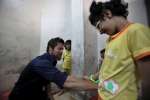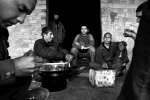- Text size
 |
|  |
|  |
| 
- عربي
Mediterranean: another weekend of Tragedy
News Stories, 15 September 2015
GENEVA, Sept 15 (UNHCR) – Tragedy marked the Mediterranean again last weekend as two more boats capsized in Greek waters, killing 39 people, including 15 children and four babies.
The boats, which capsized on Saturday and Sunday off the coast of Farmakonisi and Samos, had Syrians, Iraqis and other people fleeing war and conflict on board and looking for safety in Europe.
Meanwhile, UNHCR has received unconfirmed reports of yet another tragedy today (September 15) in which it is believed another 22 people, including four children have drowned when a boat bound for the Greek island of Kos capsized in the Aegean sea off the coast of Turkey's southwestern Datça district.
At least 22 migrants, including four children, have drowned while 211 migrants have been rescued after a Kos-bound boat capsized in the Aegean Sea.
The 20-meter wooden boat, which was also used for boat tours, capsized at around 6 am. Five coast guard boats were dispatched to the crash site, and 211 refugees and migrants were rescued.
Sunday's shipwreck, with 34 victims, is thought to be the largest recorded from any single accident in Greek waters since the refugee crisis in Europe began. So far, almost 300,000 people have made the short but dangerous journey from Turkey to Greece, on overcrowded boats and flimsy inflatable dinghies.
The deaths happened at the same time as European countries were tightening border control and considering increasingly severe measures to stop people crossing. Hungary has completed a razor-wire fence against its border to Serbia, and Germany, Austria and Slovakia – after two decades of open borders – have temporary reinstated border controls. The Netherlands have reportedly also started carrying out spot-checks at its borders.
The UN Refugee Agency (UNHCR) has warned that refugees could "find themselves moving around in legal limbo" and that the announcement of different border control measures by European states "only underlines the urgency of establishing a comprehensive European response".
Among the dead in Saturday's shipwreck were three Iraqi children – three siblings. Deep in shock, their mother is now being taken care of on the island of Samos. UNHCR staff is on the ground providing immediate help with counseling, interpretation, accommodation and other basic needs. Those who did not survive the journey have been sent to Rhodos island, where the family members will now travel to bid their final farewell to their loved ones.
By Marjanna Bergman, Geneva

































